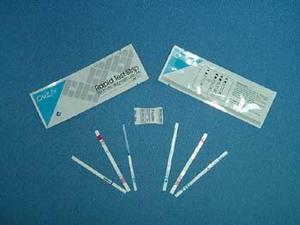MalariaNew malaria test kit would help global elimination efforts
A new, highly sensitive blood test that quickly detects even the lowest levels of malaria parasites in the body could make a dramatic difference in efforts to tackle the disease in the United Kingdom and across the world, according to new research.

More rapid testing means more rapid treatment // Source: uploadimage.cn
A new, highly sensitive blood test that quickly detects even the lowest levels of malaria parasites in the body could make a dramatic difference in efforts to tackle the disease in the United Kingdom and across the world, according to new research published in the Journal of Infectious Diseases.
A London School of Hygiene and Tropical Medicine release reports that in two studies led by researchers in the United Kingdom and Switzerland, the new LAMP (loop-mediated isothermal amplification) test was compared to existing methods in London laboratories that deal with imported cases of malaria to the United Kingdom, and to diagnostic methods used in the field in Uganda, where malaria is a leading cause of illness and death.
The simple test, which can be performed by a non-specialist health worker and does not need refrigerating like other tests, requires a sample of blood to be processed and placed in a test tube with a reactive powder then heated. If the malaria-causing Plasmodium parasites are present, the tube glows green. The whole process takes less than an hour.
The first study, led in London by the Hospital for Tropical Diseases (HTD), the Foundation for Innovative New Diagnostics, and the London School of Hygiene & Tropical Medicine, compared LAMP to existing laboratory diagnostic methods on 705 blood samples of suspected imported malaria cases in the United Kingdom.
Dr. Colin Sutherland, clinical scientist at HTD and reader in Parasitology at the Malaria Reference Laboratory at the London School of Hygiene & Tropical Medicine, said: “According to data collected for Public Health England by the London School of Hygiene & Tropical Medicine, the U.K. treats at least 1,500 cases of imported malaria every year. Despite the very best efforts of the NHS, a handful of malaria related deaths still occur annually in U.K. hospitals. The new LAMP test for malaria performed very well when tested in the parasite reference laboratory at HTD, and correctly identified every malaria patient out of 705 malaria tests performed.
“An important advantage of LAMP is that non-specialist staff in any hospital in the U.K. will be able to accurately and rapidly detect the presence of malaria parasites, and immediately begin treatment without waiting for confirmation from local experts or specialist laboratories. This speed of diagnosis can make the difference between an uncomplicated episode of malaria that rapidly responds to treatment, and progression to severe disease, organ failure and heightened
